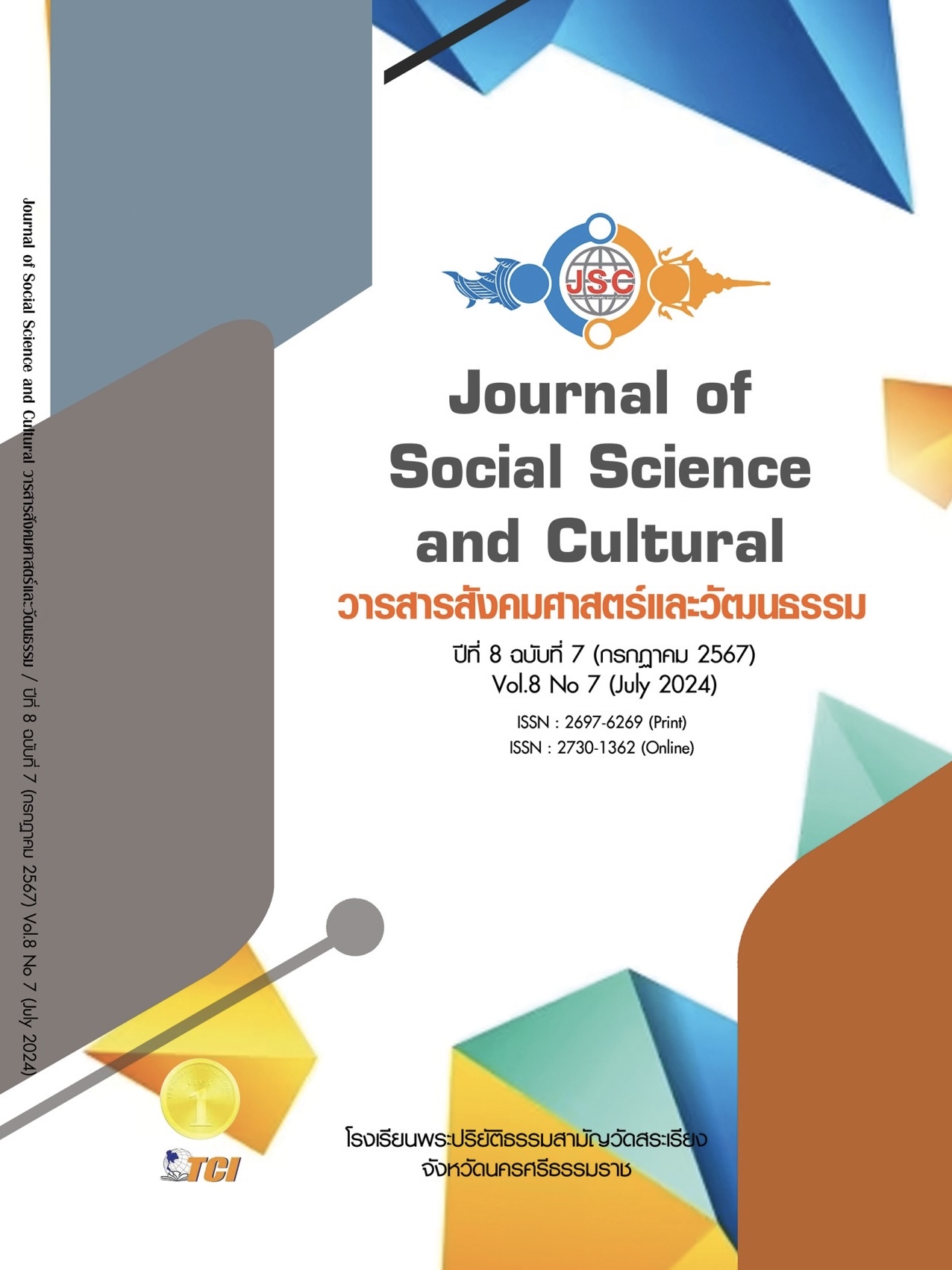SOFT POWER AWARENESS ON PERCEPTIONS OF INTERNATIONAL TOURISTS VISITING SAMUI ISLAND, SURAT THANI PROVINCE
Main Article Content
Abstract
The objective of this study was to investigate an awareness of soft power in Thailand within a context of tourists’ perceptions on Samui Island. The quantitative research was employed for data collection on a sampling group of 400 international tourists whose age was over 18 years old. The research tool was a questionnaire and a random convenient selection method. The descriptive statistics of standard deviation, percentage and mean ()was used. The findings disclose that the sampling group consisted of 224 females and 176 males; their age was between 21 - 37; 243 people were single; 196 were working with the private enterprises; 62 were Russian; and, 155 were earning between US$ 1,001 - 2,000. The analytical results based on Objective1 show that their soft power awareness is at a medium level in 5 aspects. However, upon considering on each aspect from high to low, each reveals as: 1) Thai boxing has an indication of the highest mean on the art of self-protection; 2) Thai Cuisine also has the highest mean on the title of varieties; 3) Thai Traditions and Cultures similarly unveil the highest mean on people’s manners and friendliness; 4) Thai Fabric has its highest mean on design; and, 5) Thai Films shows the highest mean on views.
Article Details
References
กระทรวงการท่องเที่ยวและกีฬา. (2566). สถิติด้านการท่องเที่ยว ปี 2563. เรียกใช้เมื่อ 10 เมษายน 2567 จาก https://www.mots.go.th/news/category/740
ธนิกานต์ มะรินทร์. (2559). การรับรู้ประชากรศาสตร์ที่มีต่อการท่องเที่ยวเชิงศาสนาอย่างยั่งยืน: กรณีศึกษวัดสมานรัตนาราม จังหวัดฉะเชิงเทรา. ใน วิทยานิพนธ์ศิลปะศาสตร์มหาบัณฑิต สาขาวิชาการจัดการท่องเที่ยวแบบบูรณาการ. สถาบันพัฒนบัณฑิตบริหารศาสตร์.
นิติราษฎร์ บุญโย. (2565). soft power ของไทย? ความหมาย ความจริงและความฝัน กรุงเทพธุรกิจ. เรียกใช้เมื่อ 10 เมษายน 2567 จาก https://www.bangkokbiznews.com/blogs/columnist/999871
นิทัศน์ พวงบุปผา. (2565). นายสนามมวยเพชรบัญชา เกาะสมุย ขอบคุณรัฐบาลผลักดันมวยไทยสู่ Soft Power เชื่อจะฟื้นเศรษฐกิจและตอบโจทย์กีฬามวย. เรียกใช้เมื่อ 10 เมษายน 2567 จาก https://www.talknewsonline.com/491825/
บงกช เดชมิตร และคณะ. (2567). การรับรู้อาหารไทยของนักท่องเที่ยวชาวมาเลเซีย. Sripatum Chonburi Academic Journal, 20(3), 11-19.
ปราณี หลำเบ็ญสะ. (2559). การหาคุณภาพของเครื่องมือวัดและประเมินผล. ยะลา: มหาวิทยาลัยราชภัฏยะลา.
พีรวัส อินทวี และคณะ. (2565). การศึกษาการรับรู้วัฒนธรรมอาหารพื้นเมืองจังหวัดสุรินทร์ของนักศึกษามหาวิทยาลัยราชภัฏสุรินทร์. วารสารศิลปะและวัฒนธรรมลุ่มแม่น้ำมูล, 11(2), 1-14.
ภูริณัฐ แก้วสิยา. (2566). ประเภท Soft Power (5F) ที่ใช้สื่อสารส่งผลต่อการตัดสินใจมาท่องเที่ยวจังหวัดนครศรีธรรมราช. วารสารกองทุนพัฒนาสื่อปลอดภัยและสร้างสรรค์, 2(2), 54-82.
รามณรงค์ นิลกำแหง. (2565). การรับรู้ทุนทางวัฒนธรรมของแหล่งท่องเที่ยวในจังหวัดนครราชสีมาผ่านมุมมองของนักท่องเที่ยวชาวไทย. วารสารศึกษาศาสตร์, 9(1), 111-120.
สุนทรี ทับมาโนช. (2566). ชุมชนท่องเที่ยวบ้านหินลาด เกาะสมุย ชู soft power สมุนไพร และ อาหารเป็นจุดขายการท่องเที่ยว. เรียกใช้เมื่อ 10 เมษายน 2567 จาก https://thainews.prd.go.th/th/news/detail
สุภาพิชญ์ ถิระวัฒน์. (2565). Soft Power อำนาจละมุน ร้อยเรื่องเมืองไทย. เรียกใช้เมื่อ 10 เมษายน 2567 จาก https://library.parliament.go.th/th/radioscript/rr2565-may7
โสพิชา เถกิงเกียรติ และชยาพล ชมชัยยา. (2566). ช่องทางการรับรู้ของคนไทยต่อการจัดแสดง Soft Power ของรัฐบาล ในการประชุม APEC 2022. วารสารกองทุนพัฒนาสื่อปลอดภัยและสร้างสรรค์, 2(1), 15-42.
Beerli, A. & Martin, J. D. (2004). Tourists' characteristics and the perceived image of touristdestinations: A quantitative analysis-a case study of Lanzarote, Spain. Tourism Management, 25(5), 623-636.
Cochran, W. G. (1954). Some methods for strengthening the common χ2 tests. Biometrics, International Biometric Society, 10(4), 417-451.


